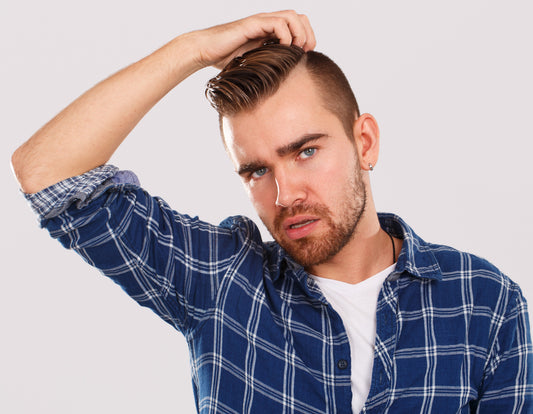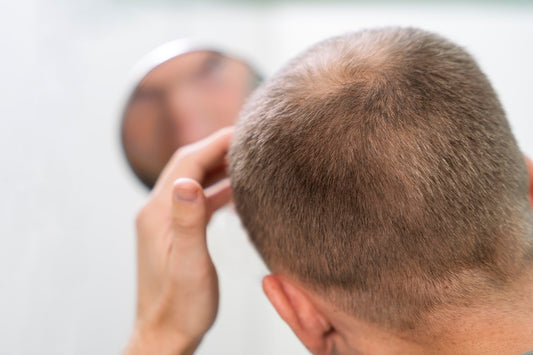Hair loss affects countless individuals worldwide, with men being the most afflicted demographic due to male pattern baldness, a condition influenced by genes and certain hormones.
The social stigma and confidence depletion often associated with hair loss drive many to seek solutions, ranging from medical treatments to natural supplements.
This comprehensive guide aims to explore these various options in detail, aiding you in making informed decisions about managing hair loss and promoting hair regrowth.
Understanding Hair Loss: Causes and Triggers
Comprehending the reasons behind hair loss is crucial for effective treatment. Hair loss can spring from multiple causes, and understanding these can lead to more successful interventions.
Genetic Factors
The most common type of hair loss, Androgenetic Alopecia or male pattern baldness, is primarily driven by genes. This genetically predisposed condition can be inherited from either or both parents. Simply, if hair loss runs in your family, you are more likely to experience it as well.
Nutritional Deficiencies
Proper nutrition is essential for healthy hair. Deficiencies in essential nutrients, such as vitamins A, D, and E, proteins, and iron, can lead to hair fall. A balanced diet rich in these nutrients can contribute to healthier, stronger hair.
Hormonal Imbalances
Hormonal changes can heavily influence hair health. An excess or deficiency of certain hormones, especially thyroid hormones or sex hormones like estrogen and testosterone, can trigger hair loss.
Medical Conditions
Some medical conditions, such as alopecia areata, lupus, and scalp infections like ringworm, can result in dramatic hair loss. Moreover, hair loss is a common side effect of chemotherapy and radiation therapy for cancer treatment.
Medications
Certain prescription medications, such as those used for arthritis, depression, high blood pressure, and heart problems, can contribute to hair loss.
Stress
Often overlooked, extreme stress can lead to temporary hair loss. This generally reverses once the stressful period subsides.
Aging and Family History
With advancing age, both men and women tend to experience thinning of hair and a receding hairline. The pattern and degree of hair loss are often similar to that observed in other family members, as the genetic aspect of this condition is quite strong.
Medical Treatments for Hair Regrowth
Several medical treatments have been approved by the FDA to prevent or slow hair loss and stimulate hair regrowth in men. These treatments often work by addressing the underlying hormonal influences responsible for hair thinning and loss or by stimulating hair growth at the follicle level.
Minoxidil (Rogaine)
Minoxidil is an over-the-counter topical treatment that promotes hair regrowth by enlarging miniaturized follicles, allowing them to produce thicker and longer strands of hair. It's typically applied twice a day to the scalp and is most effective in the early stages of hair loss.
Some users may experience side effects like scalp irritation, and it may take several months before noticeable improvement is observed.
Finasteride (Propecia)
Finasteride is a prescription medication that prevents the conversion of testosterone to dihydrotestosterone (DHT), a hormone implicated in male pattern baldness. Reducing DHT levels can slow or even reverse hair loss in some men, but the effect only lasts as long as the medication is taken. Side effects can include sexual dysfunction and mood changes.
Low-Level Laser Therapy (LLLT)
LLLT involves the application of specific wavelengths of light to the scalp to stimulate hair follicles and promote growth. It's a non-invasive treatment that has shown promising results in some studies, often available through in-clinic treatments, professional home devices, or even laser combs and headbands. Consistent use is necessary for optimal results, and it might not be effective for everyone.
Natural Supplements for Hair Regrowth
Beyond medical treatments, many individuals opt for natural supplements, either as a standalone approach or in conjunction with other treatments. These supplements generally aim to address nutritional deficiencies that might be affecting hair health and growth.
Biotin
Biotin (B-Vitamin) is known to strengthen hair and nails due to its role in the health of keratin, the protein that makes up hair. While taking biotin supplements can help improve the quality of hair and potentially slow hair thinning, it does not directly promote hair regrowth.
Saw Palmetto
Often considered a natural alternative to finasteride, saw palmetto is believed to block the conversion of testosterone to DHT. Studies are ongoing regarding its efficacy, but some people have reported slow, gradual hair regrowth with consistent use.
Omega-3 Fatty Acids
Omega-3s are essential fats necessary for overall health, including hair health. They can help support hair thickness and density, though they might not significantly impact hair regrowth. That said, maintaining an adequate intake might help slow down hair loss.
Iron, Vitamin-D, and Zinc
If deficiency is the cause of hair loss, a supplement could potentially slow this loss and aid in hair regrowth. Adequate Vitamin-D levels are needed to support healthy hair follicles, while iron and zinc play critical roles in hair growth and repair.
Medical Treatments vs Natural Supplements: Which one to choose?
Deciding between medical treatments and natural supplements for hair regrowth can be a daunting task considering the variety of factors at play.
Considering Medical Treatments
Medical treatments are often sought after for their verification of effectiveness through scientific testing and their ability to deliver substantial results more quickly. They are especially suited for those experiencing significant hair loss. However, the potential for side effects is an important consideration.
The pros:
- Typically provide more immediate results.
- Effectiveness verified through rigorous scientific testing.
The cons:
- May come with potential side effects.
- Cost: Generally more expensive than natural remedies and require a doctor's prescription.
Weighing Natural Supplements
For those favoring a holistic approach or experiencing only mild hair loss, natural supplements emerge as a safer choice with few, if any, side effects. However, the results are often more subtle and emerge over time.
The pros:
- Few, if any, side effects.
- A holistic approach to hair health.
The cons:
- Usually work more slowly and subtly.
- More suitable for mild cases of hair loss.
In conclusion, the choice depends greatly on individual preferences, current health status, and the degree of hair loss. Consultation with a healthcare provider can further aid in making an informed decision.
Conclusion
Embarking on the journey to hair regrowth can be complex, often leaving you confronting an overwhelming range of treatments and supplements. A consultation with a reliable healthcare professional could be invaluable in this scenario, offering advice tailored to your unique needs.
In your pursuit of a solution that supports and preserves healthy, robust hair, consider Mohebi Confidence Hair Health Support. Our daily supplement for men's hair health combines nature's elements with advanced science for effective results.
Remember, achieving healthier hair requires patience and persistence. With Mohebi Life, you're not merely embarking on a journey towards optimal hair health, but a path to confidence and resilience.
FAQs
What is the most effective supplement for hair growth?
The effectiveness of a hair growth supplement depends on the individual's nutritional needs and the cause of hair loss. Biotin is widely regarded as beneficial for hair strength and quality, but other supplements like saw palmetto, iron, vitamin D, zinc, and omega-3 fatty acids may also support hair growth. It's essential to address any nutrient deficiencies to improve hair health.
Do hair regrowth supplements work?
Hair regrowth supplements may work if a nutritional deficiency is causing hair loss. Although not guaranteed to bring about significant regrowth, supplements can contribute to overall hair health, thickness, and improved quality. Supplements supporting hair health often work best in conjunction with other treatments or lifestyle changes to address the root cause of hair loss.
What are the big 3 for hair regrowth?
The "big 3" for hair regrowth refers to the three major FDA-approved treatments for hair loss:
- Minoxidil (Rogaine) – A topical over-the-counter treatment that promotes hair regrowth by enlarging miniaturized hair follicles.
- Finasteride (Propecia) – A prescription medication that inhibits the conversion of testosterone to DHT, a hormone implicated in hair loss.
- Low-Level Laser Therapy (LLLT) – A non-invasive treatment that uses specific wavelengths of light to stimulate hair growth at the follicle level.
Which natural ingredient is best for hair regrowth?
There is no single "best" natural ingredient for hair regrowth, as effectiveness varies depending on individual factors and hair loss causes. However, some popular and potentially beneficial ingredients for hair health include saw palmetto for its potential DHT-blocking properties, biotin for its role in keratin health, and essential oils like peppermint or rosemary oil for their scalp-stimulating effects. Consult a healthcare professional for personalized guidance.


